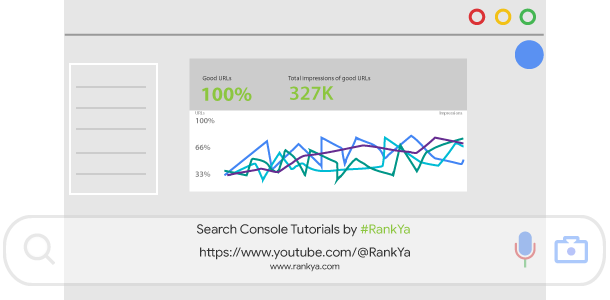Welcome to the 2025 Mini Course on Google Search Console (GSC) by RankYa. This course is designed to help you understand and utilize Google Search Console effectively in 2025. Whether you’re a beginner or looking to refresh your knowledge, this course will guide you through the essential features and tools of GSC.
Quick Links – Table of Contents
- Video Tutorial for Using Google Search Console in 2025
- Introduction to Google Search Console
- Setting Up Google Search Console
- Understanding the Dashboard
- Performance Reports
- URL Inspection Tool
- Indexing and Sitemaps
- Core Web Vitals
- Enhancements and Rich Results
- Security & Manual Actions
- Advanced Tips for 2025
Video Tutorial for Using Google Search Console in 2025
Introduction to Google Search Console
Search Console is a free webmaster tool provided by Google to help website owners or managers monitor, maintain, and troubleshoot their site’s presence in Google Search results. It provides insights into how Google views your site and helps you optimize its performance.
Key Benefits:
- Monitor your site’s search performance.
- Identify and fix indexing issues.
- Submit sitemaps and individual URLs for crawling.
- Receive alerts for critical issues that can negatively effect website’s presence in search.
Setting Up Google Search Console
To get started, you’ll need to add a website (in search console this is called ‘Property’), follow these steps:
- Sign in to Google Search Console: Visit Google Search Console and sign in with your Google account.
- Add a Property: Click on “Add Property” and enter your website address (https://www.example.com OR domain address example.com)
- Verify Ownership: Choose a verification method (easy options: HTML file upload and meta tag verification) (not so easy option: bit technical is adding a DNS record as you will need access to DNS records), to prove you own the website.
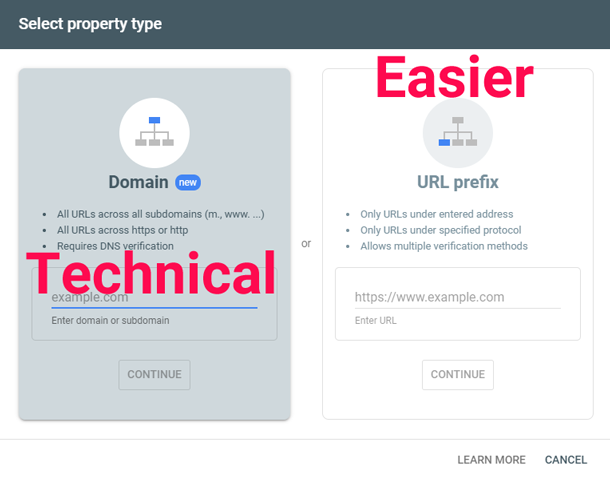 One you’ve verified your ownership, you can now use Search Console. First thing to do is Submit a Sitemap. Pro Tip: XML sitemaps can have parent/child relationships, parent sitemaps encompasses all individual sitemaps. Most websites (including eCommerce sites) do not need to submit parent sitemap to Search Console. Simply ask yourself, which parts of your website has original and unique content (usually Pages, Products, Blog Posts) Google should index? Submit only those individual sitemaps to help Google crawl only important parts of your website efficiently.
One you’ve verified your ownership, you can now use Search Console. First thing to do is Submit a Sitemap. Pro Tip: XML sitemaps can have parent/child relationships, parent sitemaps encompasses all individual sitemaps. Most websites (including eCommerce sites) do not need to submit parent sitemap to Search Console. Simply ask yourself, which parts of your website has original and unique content (usually Pages, Products, Blog Posts) Google should index? Submit only those individual sitemaps to help Google crawl only important parts of your website efficiently.
Understanding the Dashboard
The GSC dashboard is your central hub for all data and tools. Here’s what you’ll see: 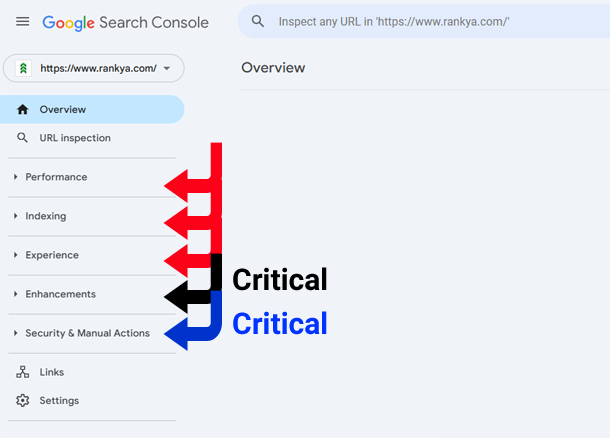
- Performance Report: Shows clicks, impressions, CTR, and average position.
- Indexing: Highlights indexing issues.
- Enhancements: Provides insights related to rich results and structured data.
- Security & Manual Actions: Alerts you to security issues or manual penalties.
- Links: Shows link profile for ‘Top linked pages sites and text’ (internal and backlinks).
- Settings: Shows general settings (ownership details, Crawl Stats, robots.txt file report).
Performance Reports
The Performance Report is one of the most valuable tools in GSC. It provides data on:
- Queries: What search terms are driving traffic to your site.
- Pages: Which pages are performing best.
- Countries: Where your traffic is coming from.
- Devices: How users are accessing your site (mobile, desktop, tablet).
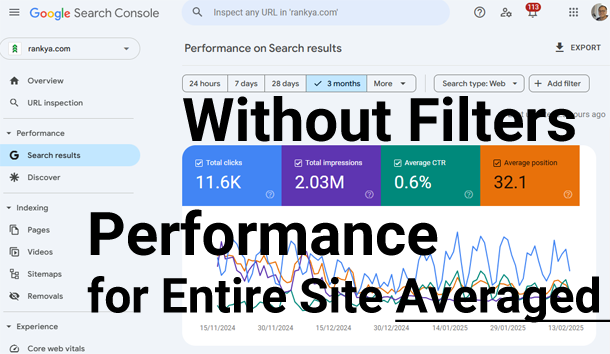
How to Use:
- Filter data by date, query, page, country, or device.
- Identify high-performing keywords with high ‘Impression’ count. Press on the query and you’ll see which pages are performing well for those queries (optimize page title, create complimentary content, add new fresh useful content to that page) or (create related content and link pages together).
- Optimize underperforming content (look for high ‘Impression’ count as well as ‘Position 3 till 9th’ these can be boosted up in Google rankings by optimizing those pages).
URL Inspection Tool
The URL Inspection Tool allows you to check the indexing status of a specific URL and troubleshoot issues. 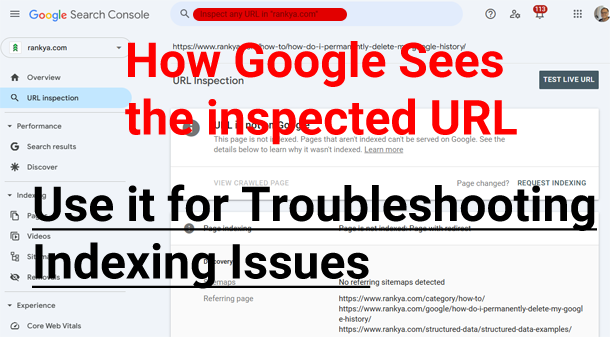
Features:
- Check if Google has indexed the URL or why the URL is not on Google.
- View Discovery Crawl history and indexing details.
- Request indexing for new or updated pages after you fix any Page Indexing issues.
Indexing and Sitemaps
Ensuring your web pages are properly indexed is crucial for visibility in Google search results. 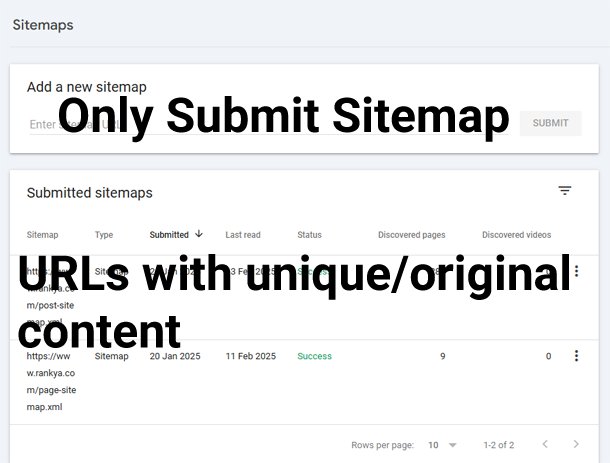
Steps:
- Submit a Sitemap: Go to the “Sitemaps” section and submit your XML sitemap.
- Check Indexing Reports: Identify and fix any indexing errors (e.g., page with redirect, Excluded by ‘noindex’ tag, Crawled – currently not indexed and other issues).
- Use the URL Inspection Tool: Find out how Google Discovered the problem URL and what is causing indexing issues.
Core Web Vitals
The Core Web Vitals report shows how your pages perform, based on real world usage data (based on Google Chrome User-Experience). Focus your attention to “Poor URLs” and ensure there are none. 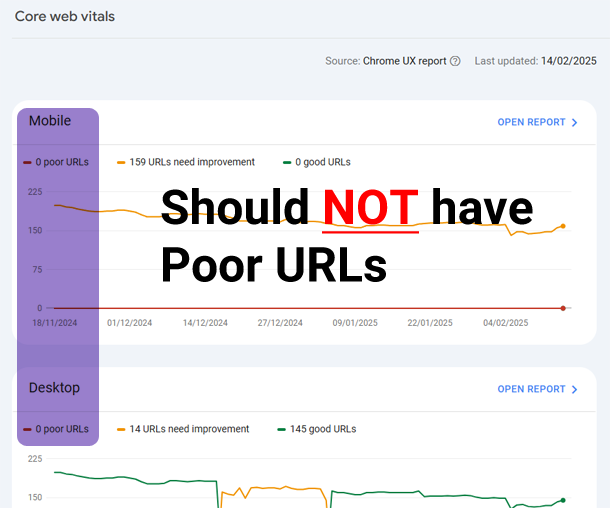
Enhancements and Rich Results
Enhancements help you optimize your site for latest Structured Data supported by Google, these are called Search Gallery Rich Results, such as:
- Structured Data: Add schema markup Structured Data to enhance search listings and take advantage of future of Google search engine results page.
Search Console Enhancements reports will show you if the Schema Markup is valid on your website, if not, validate your schema markup code. 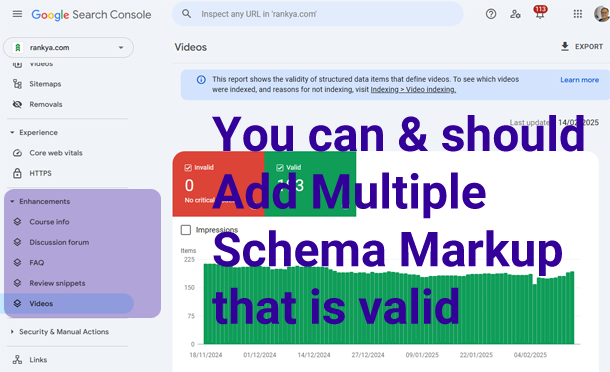
Security & Manual Actions
Google Search Console alerts you to security issues (e.g., hacking, malware) and manual actions (penalties for violating Google’s guidelines).
What to Do:
- Regularly check the “Security & Manual Actions” section.
- Resolve any issues promptly to avoid ranking drops.
Advanced SEO Tips for 2025
Stay ahead in 2025 with these advanced tips:
- AI-Overview: Leverage Google’s AI Overview results by ensuring you follow Google Guidelines and fully optimize your website.
- Rich Results Optimization: Optimize your site using Structured Data (this is the future of SEO) as it helps Google better understand your website.
- Video Content: Use GSC to track video performance in search results if you’re publishing video content.
- E-A-T Signals: Focus on Expertise, Authoritativeness, and Trustworthiness when creating useful original and user-focused content to improve rankings.
Stay Ahead in Search
Google Search Console is an indispensable tool for website owners and SEO professionals alike. By mastering its features, you can improve your site’s visibility, fix issues, and stay ahead of the competition in 2025.
Ready to Get Started?
Visit Google Search Console Help Section to learn more and take control of your website’s performance.
